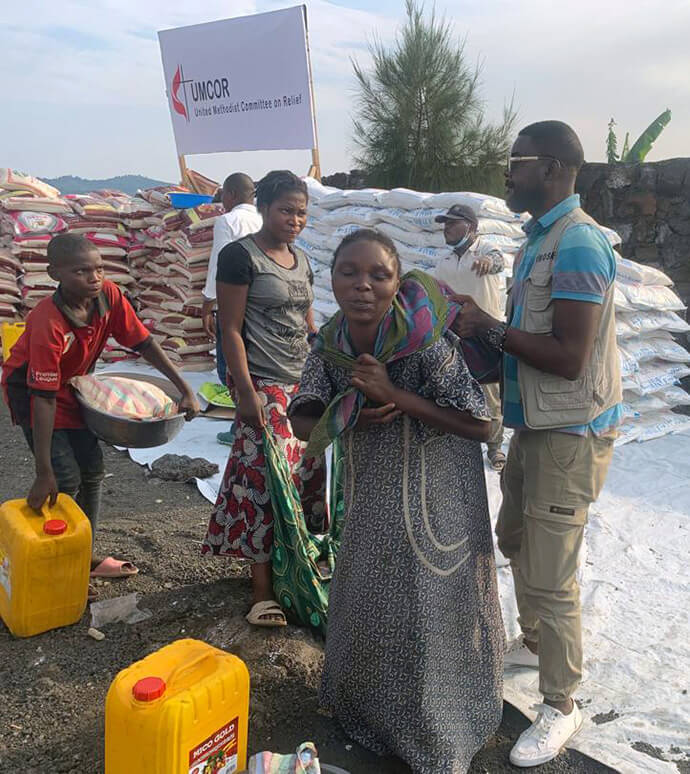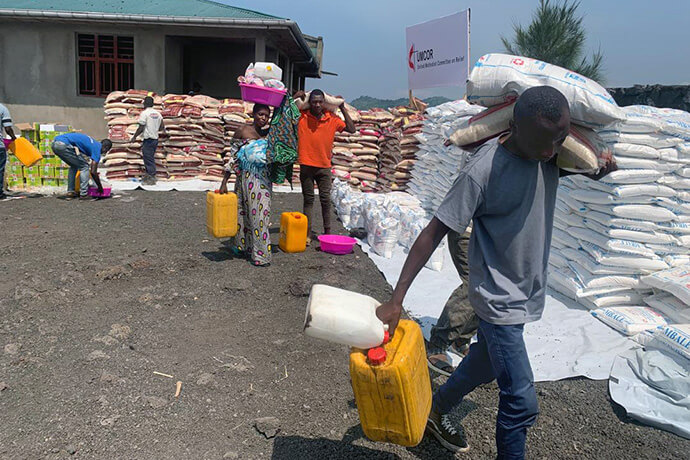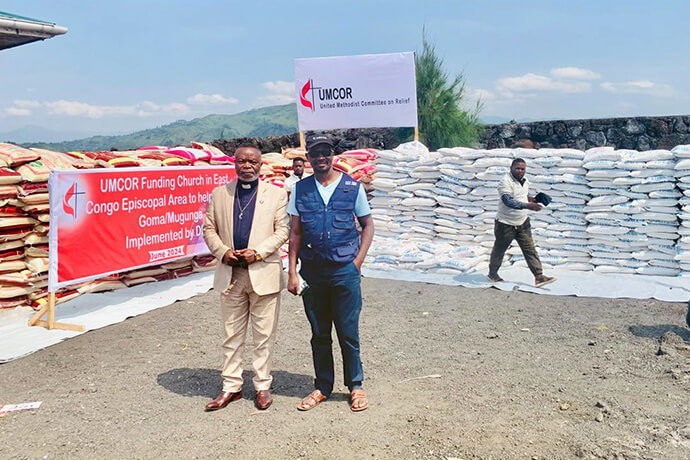
Key points:
- The United Methodist Church distributed over 198 tons of food and non-food items to displaced families in the Masisi region.
- Each household received one month’s food aid and essential non-food items.
- The church also provided feminine hygiene supplies and organized educational sessions for displaced women.
The United Methodist Church recently provided humanitarian aid to people displaced by the war in eastern Democratic Republic of Congo.
In mid-June, a team from the United Methodist Disaster Management Office in the Eastern Congo Episcopal Area brought food and humanitarian assistance to some 12,500 people representing 2,500 families. The recipients had fled the war in the Masisi region, seeking refuge in the Mugunga district of Goma, the capital of the South Kivu province.
The United Methodist Committee on Relief, the humanitarian aid and development arm of The United Methodist Church, disbursed $250,000 to purchase over 198 tons of food and non-food items.
Jean Tshomba, coordinator for UMCOR’s Disaster Management Office in eastern Congo, said the precarious situation is of constant concern to The United Methodist Church. He noted that UMCOR has offered relief to the most vulnerable households.
“We have helped 12,500 displaced people in Goma,” he said, “to alleviate their suffering by providing each household with one month’s food aid and essential non-food items.”
Each household received rice, corn flour, cooking oil, beans, sugar, salt, plastic containers, empty cans, toilet soap, laundry soap, toothbrushes, toothpaste, sanitary napkins and underwear.
Over the past two years, the church has stepped up its assistance to displaced persons in eastern Congo.
Resident Bishop Gabriel Yemba Unda expressed deep sadness and a sense of urgency to act.
“My heart bleeds,” he said, “when I see the distress of these innocent men, women and children, forced to flee their homes and live in such precarious conditions. We cannot remain indifferent to their suffering.
“This situation is a real humanitarian tragedy. Urgent action is needed to put an end to conflict and ensure the safety of populations.”

Since March 2022, March 23 Movement (M23) rebels have resumed hostilities and gained ground in eastern Congo. This armed group has taken control of several localities in the North Kivu province.
Ineza, a beneficiary, thanked The United Methodist Church and the bishop for the gesture of love toward God’s people.
“I’m delighted today,” she said, “because I have just found food once again. I plead with the church to consider building houses. We live in very precarious conditions, and we are scared because of the rains that fall every day here in Goma.”
In addition to food assistance, The United Methodist Church also supports women living in the camps for displaced persons by providing feminine hygiene items.
Dr. Damas Lushima, general coordinator of the Department of Health in the Eastern Congo Episcopal Area, pointed out that displaced people, particularly women, live in difficult conditions.
“Aware of the importance of intimate hygiene, the church has organized education and awareness sessions specifically dedicated to women,” Lushima said. “During these meetings, essential information on menstrual hygiene management and infection prevention was shared. Kits including sanitary strips and underwear were also distributed.”
Luyolo Kibungabo, a refugee from Kichanga, lives in the Bulengo camp near Goma. She described the initiative as beneficial.
“The teachings we received,” she said, “opened our eyes to essential subjects such as protection, behavior in the camp and prevention of unwanted pregnancies.
“Before that, we were desperately short of information. Thanks to The United Methodist Church, we also received items for feminine intimate care. Managing our menstrual periods was a real challenge, but this support will enable us to do it more hygienically.”
Unda encouraged the church to continue to help the displaced.
“As Christians,” he said, “we are called to be the hands and feet of Jesus, to love our neighbor and care for the most vulnerable. We must mobilize to continue to support these people who have lost everything.
“We pray that God will give strength and courage to these displaced people, console them in their grief and open a path to peace and reconciliation.”
Londe is a UM News correspondent in Congo.
Press contact: Julie Dwyer, news editor, newsdesk@umcom.org or 615-742-5469. To read more United Methodist News, subscribe to the Free Daily or Weekly Digests.




